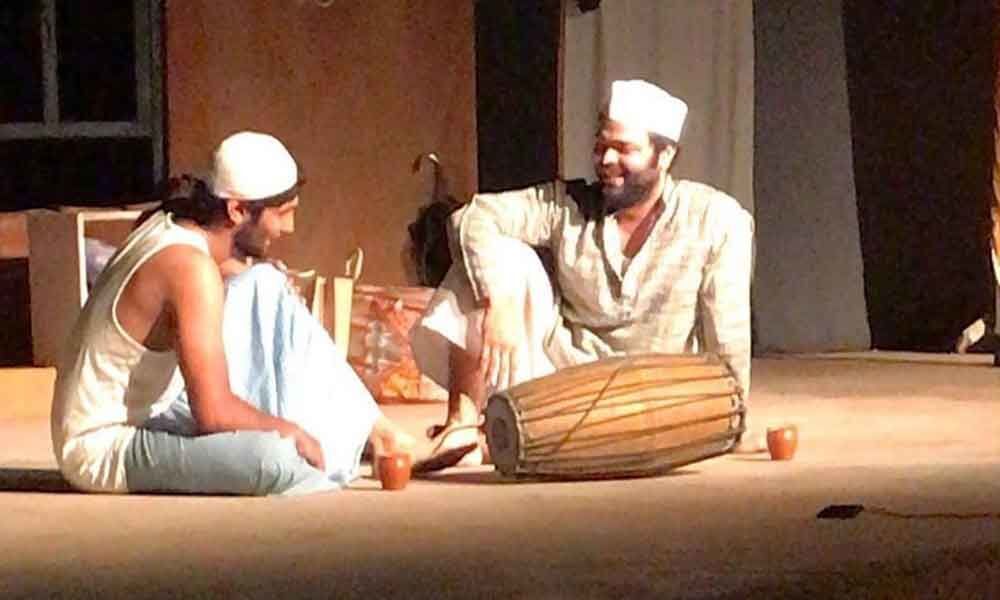Live
- AI and Fraud Prevention in Pharmacy: Fayazoddin Mohamad’s Vision for a Safer Industry
- The Future of Healthcare: Bharath Kumar Kakkireni on Transforming Patient Care with Innovative Solutions
- We expected better results in Maha polls: Congress
- Jana Sena Party Celebrates Sathya Sai Baba's 99th Birthday with Community Service Initiatives
- Jana Sena Party Celebrates Sathya Sai Baba's 99th Birthday with Community Service Initiatives
- Experience the Best Human Hair Extensions with Gemeria
- Advanced F&O strategies for experienced investors - Straddles, strangles, Iron condors
- Dr. Harikiran Chekuri suggests that a hair transplant can help regain hair growth to reclaim confidence and self-esteem
- Chandrababu Praises Mahayuti Alliance for Maharashtra Assembly Elections win
- Where Drops Define Destiny: The Elite Chronicles of IPC's 30th Revolution
Just In
When womanly wiles overcome unbridled lust


Man-woman relationships, especially those outside the marital space, have always been complex and end up revealing much lesser than what they actually end up as.
Man-woman relationships, especially those outside the marital space, have always been complex and end up revealing much lesser than what they actually end up as. Indeed, it takes off at a dizzying pace when it happens and enmeshes the entire lot of people who get sucked into the whirlpool of passion and emotion, an unavoidable consequence for sure.
This is the core element of the Hindi play 'Sakharam Binder' staged by Kissago on Sunday night at Phoenix Arena, Madhapur to an impressive response from an overwhelmingly young audience.
Living by his own set of rules, Sakharam (Jay Jha), a binder in a printing press feels anything is okay if it is truthful. Under this overarching mindset, he has his own take when he brings home abandoned women, who were other men's wives and makes them do his bidding for a shelter over their heads.
This includes sexual slavery to the extent of dominating them with his insatiable, lustful appetite. His justification for his behaviour is typical: he gives the woman what she wants and if she does not comply, she would be packed off to wherever she wishes to go. Then he would go scouting for the next 'bird', much to the delight of his partner-in-crime, Daood (Kedar Subedar), who fancies a chance for himself in the entire process.
Heart-wrenching complications arise when a submissive woman, Lakshmi (Aditi Kandpal) whom he sends off is replaced by an assured, haughty Champa (Adity Roy Sinha) who challenges his domineering ways, is disobedient and repels his advances whenever he demands sex. Hidden behind her militant façade is a sad story of sexual abuse and humiliation by her ex-husband, Vyakti (Vasant Sagar) who is shown trying to win her over once again.
Further troubles arise when Lakshmi returns to Sakharam's home, manages a deal with Champa and stays put despite the man protesting against it. The tussle for the exclusive male attention and support and how both play up their insecurities to further cement their positions in the household is a natural fall out.
Things take a critical turn at the climax as the silent, suffering woman manages to win over the harassed male even as she asserts her domination in that house from thereon.
Director Bhagyashree Tarke, an NSD alumna, has endeavoured to put together a two-hour drama, with a break in between. The play was sustained well by strong performances by the cast, who were allowed to improvise too, here and there, as the situation demanded.
The clear-cut role plays, each one of them were provided with gave adequate chances to perform and excel as a team. The uninhibited enacting of intimate scenes, keeping in tune with the sensibilities of the audience too added to the impact. A gentle veneer of comedy by a few characters here and there was noticeable.
Yet, the pace was uneven, with the starting 20 minutes, a warm-up of sorts, before the characters begin making their mark. The uni-dimensional presentation of the protagonist, a bohemian, boorish man, which may have been the original visualisation of the playwright denies the character, the opportunity to be judged better by the audience who does not get enough of his persona.
A sense of monotony gets into the proceedings after the first hour, when the audience understands it is going to be a game of outwitting one another from here on. However, the backend work for the play right from the props, background audio support and music score seemed adequate.
For nearly five decades in the theatre circuits of the country, this play of noted playwright Vijay Tendulkar, set in the Konkan region of Maharashtra, has always elicited great interest. Originally written in 1972 and banned in 1974, it has survived moral censoring and the guardians of public morality over the years as it deals with a subject which has never generated a feel good, happy ambience to enable it being discussed comfortably by theatre lovers.
All the same, it has been popular, with it being translated into other Indian languages including Hindi. Also, much research has been made on it, books have been published and it has also travelled overseas to be staged at an off-Broadway venue.

© 2024 Hyderabad Media House Limited/The Hans India. All rights reserved. Powered by hocalwire.com






